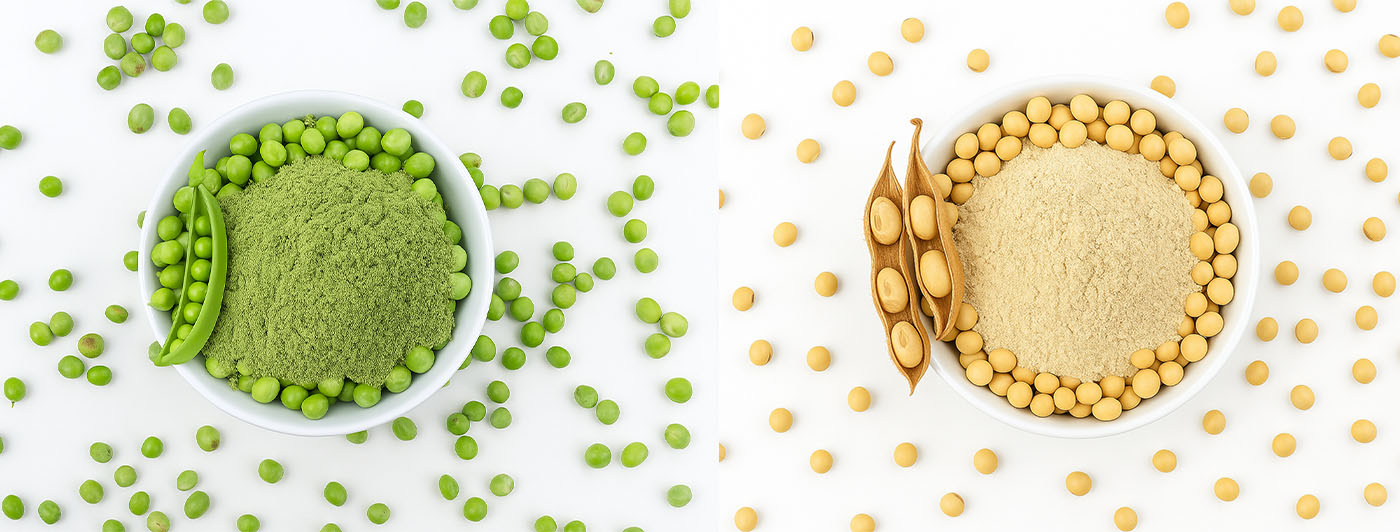Trying to choose the right protein powder for muscle growth? You're not alone. With so many options in the market, picking the most effective and sustainable source can feel overwhelming—especially when it comes to plant-based choices.
In the world of fitness and wellness, protein is essential—especially when your goal is to build lean muscle mass. Among the many plant protein options available, soy protein powder and pea protein stand out as two of the most debated and researched contenders. Both are excellent sources of protein, ideal for vegans and vegetarians, and have unique benefits that make them favorites in the fitness community.
But if you’re trying to decide which one will better fuel your muscle-building journey, there are several things to consider—ranging from amino acid profiles to digestion, nutrient density, and long-term health impact.
Let’s explore how soy protein powder stacks up against pea protein, with a close look at how each supports muscle growth, and which one might suit your fitness goals more effectively.
Understanding Soy Protein Powder and Pea Protein
Soy protein powder is made from defatted soybean flakes and is considered a complete protein. It contains all nine essential amino acids, making it one of the few plant-based proteins that closely rival animal protein sources. Due to its complete amino acid profile, it has long been the go-to choice for those looking to build muscle on a plant-based diet.
Pea protein, on the other hand, is extracted from yellow split peas. While it’s technically low in methionine (an essential amino acid), it is still considered highly bioavailable and easily digestible. When consumed as part of a well-rounded diet, especially alongside high protein foods, pea protein effectively supports muscle recovery and growth.
Interestingly, many people are drawn to pea protein because it’s free from common allergens such as soy, dairy, and gluten, making it a safer bet for sensitive stomachs.

Amino Acid Comparison: Muscle Growth and Repair
Muscle growth primarily depends on the availability of branched-chain amino acids (BCAAs)—especially leucine, isoleucine, and valine—which are crucial for muscle protein synthesis. Soy protein powder is rich in BCAAs and provides leucine in quantities comparable to whey, making it effective for post-workout muscle recovery.
Pea protein, while slightly lower in leucine, contains high levels of arginine and lysine. Arginine is known to support blood flow and nitric oxide production, which enhances nutrient delivery to muscles during workouts. With a bit of planning—such as combining it with foods like rice or oats—pea protein can easily deliver a complete amino acid profile.
In fact, combining pea protein with whole grains, or even something as simple as a couple of rotis (with around 3g of protein in 1 roti), ensures a balanced intake.
Digestibility and Absorption
Digestibility is a major consideration when choosing a protein supplement, especially if you're consuming it regularly. Soy protein powder has good digestibility but contains compounds called oligosaccharides and phytoestrogens. While these are safe for most people in moderate amounts, they can cause bloating or hormonal concerns in some individuals.
Pea protein, in contrast, is hypoallergenic and very gentle on the stomach. It lacks common allergens, making it an ideal option if you're sensitive to dairy or soy. Many athletes prefer it for what to eat before workout for energy, especially when they need something light and easy to digest.
This subtle advantage in digestion makes pea protein a preferred choice in protein shakes and plant based protein powder blends tailored for people with dietary restrictions.
Taste and Texture: A Practical Concern
Flavor and texture are often overlooked in protein comparisons, but they play a big role in long-term adherence to any nutritional supplement.
Soy protein powder has a distinct taste—some describe it as beany or nutty. It can be chalky if not blended properly, which may be a downside for those who enjoy smoothies or protein pancakes.
Pea protein, by contrast, tends to have a smoother texture and milder taste, making it easier to mix with different ingredients. Whether you’re using it in smoothies, energy balls, or protein oats, it blends well and is less likely to overpower your recipe. This versatility makes pea protein a frequent choice in consumer favorites like plant protein bars or shakes—and a go-to ingredient in many formulations of the best pre workout food, thanks to its ease on the stomach and mixability.
Micronutrients and Functional Benefits
While both options are rich in protein, they also bring micronutrients to the table:
Soy protein powder contains isoflavones, which may offer antioxidant and potential heart health benefits.
Pea protein often contains higher amounts of iron and magnesium—key minerals for energy, immunity, and muscle function.
Women, in particular, may benefit from the iron content in pea protein, especially if they're looking for a weight loss powder for female routines that also support strength and energy levels.
Role in a Balanced Fitness Diet
Both proteins can seamlessly fit into a muscle-building meal plan. Whether you’re planning a high calorie breakfast Indian style with protein-rich parathas, or a light shake post-workout, each protein has its place.
Some athletes prefer soy protein powder right after training because of its leucine content. Others opt for pea protein throughout the day for easier digestion and sustained energy. Blending either with carbs like bananas or oats makes an excellent option for the best pre workout food.
Given its versatility, comfort on the stomach, and nutrient density, pea protein increasingly stands out as one of the best plant based protein choices for consistent use.
Environmental Sustainability
Peas are nitrogen-fixing plants, which enrich the soil and require fewer fertilizers. Pea protein production generally has a lower environmental impact compared to soy, which—while sustainable in small-scale production—has been associated with deforestation in large-scale farming regions.
So, if eco-conscious living is part of your values, the sustainability edge may lean slightly in favor of pea protein.
Supporting Your Overall Health Goals
Your choice of protein can also support broader health goals. For instance, if you're on a fat-loss journey and want to know how to reduce face fat, including high-quality protein helps you preserve muscle while burning fat. Both soy protein powder and pea protein help with satiety, reduce cravings, and stabilize blood sugar—important factors in any fat-loss regimen.
For people aiming for lean gains or trying to stay within plant-based boundaries, both options serve well—just ensure your overall protein intake aligns with your goals.
Final Verdict: Pea vs Soy Protein for Muscle Growth?
Both soy and pea proteins deliver solid nutrition, support muscle recovery, and are excellent plant protein options for anyone looking to build lean mass. But when you factor in digestibility, allergen safety, and environmental footprint, pea protein quietly takes the lead.
It’s easier on the system, free from common sensitivities, and grown in a way that supports sustainable agriculture. While soy protein powder remains a proven performer, especially for those focused purely on muscle-building metrics, pea protein offers a well-rounded edge—nutritionally, practically, and ethically.
For those looking to fuel strength without compromise, pea protein may just be the smarter, more forward-looking choice.
Frequently Asked Questions
1. Is soy protein powder good?
Yes, soy protein powder is a good source of plant-based protein. It contains all nine essential amino acids, making it a complete protein similar to animal sources. Soy protein supports muscle growth, heart health, and post-workout recovery. It’s especially beneficial for vegetarians, vegans, and those looking for dairy-free options.
2. What is a drawback of soy protein?
A potential drawback of soy protein is that it contains phytoestrogens (plant compounds that mimic estrogen), which may raise concerns for people with hormonal imbalances or thyroid issues. Additionally, some individuals may experience bloating or digestive discomfort due to compounds like oligosaccharides.
3. Is it safe to eat soy protein every day?
Yes, eating soy protein daily is generally safe for most people when consumed in moderation. Research shows that up to 25 grams of soy protein per day is safe and may support heart health. However, individuals with soy allergies, thyroid conditions, or hormone-sensitive health issues should consult a healthcare provider.
4. What is the healthiest protein powder?
The healthiest protein powder often comes from plant based protein sources like pea protein, brown rice protein, and hemp protein. These options are rich in nutrients, easy to digest, and free from common allergens—making them ideal for muscle recovery, energy, and overall wellness.
5. Who needs to avoid soy?
People with soy allergies, thyroid disorders, or a history of estrogen-sensitive conditions such as breast cancer may need to avoid soy or limit their intake. It's also best avoided by those following a soy-free or elimination diet due to autoimmune or digestive issues.












